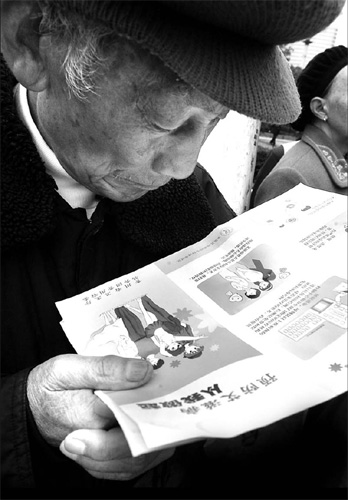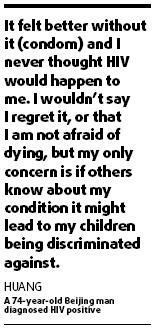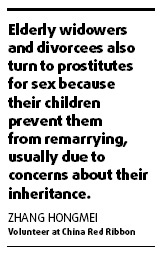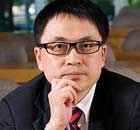Society
AIDS and the elderly: More elderly afflicted with HIV
By Cao Li in Guangzhou and Shan Juan in Beijing (China Daily)
Updated: 2010-01-11 08:24
 |
Large Medium Small |
Although illegal prostitution has become increasingly abundant in China since the late 1980s, with the sex industry enjoying boom times from 2000, said Wan Shaoping, a professor at the Sichuan Institute of Dermatology and STD Prevention in Chengdu.
|
 An elderly man reads a brochure on AIDS prevention in Guiyang, capital of Guizhou province. [Wu Dongjun/China Daily] |
"There is demand. People are getting richer and the price of a prostitute is getting cheaper," he said.
There are between 4 to 10 million female sex workers on the Chinese mainland catering regularly to more than 6 percent of the male population aged 20 to 64, according to a paper published in 2009 by Wan and Professor Joseph T.F. Lau, director of the Chinese University of Hong Kong's center for epidemiology and biostatistics.
Some women charge as little as 20 to 50 yuan ($3 to $7) and usually attract elderly men and migrant workers, the paper said.
AIDS specialist Cai said his older patients often told him they paid for sex at cheap venues - usually disguised as saunas, hair salons and massage parlors - because their wives had died or lost their sex drive after the menopause.
Elderly widowers and divorcees also turn to prostitutes for sex because their children prevent them from remarrying, usually due to concerns about their inheritance, said Zhang Hongmei, a volunteer at China Red Ribbon, a non-government organization (NGO) advocating AIDS prevention in Guangzhou.
"The sexual needs of the elderly should be fully recognized and respected by society," added Pan Suiming, a professor at Renmin University's institute of sexuality and gender in Beijing and well-known sexologist.
A Beijing man surnamed Huang, 74, who was diagnosed HIV positive in 2004, told China Daily he began paying for sex 10 years ago after the death of his wife. He never once used a condom, he said. "It felt better without it and I never thought HIV would happen to me. I wouldn't say I regret it, or that I am not afraid of dying, but my only concern is if others know about my condition it might lead to my children being discriminated against," he said.
A two-year survey by Wan Shaoping of more than 1,000 clients of female sex workers in three cities in Sichuan province found condom use was at about 40 percent for those offering the industry's "low-end services".
More than 95 percent of the men polled in 2005 and 2006, whose ages ranged from 17 to 80, admitted using a prostitute within six months of the survey. The average number of visits was 11, with the most 90. The average price paid for sex was 36 yuan.
The sex workers with the lowest fees are 30 to 60 years old, and are usually from poor rural areas or unemployed city women; they charge as little as 10 yuan, and more than 90 percent do not insist clients wear condoms, Wan's study discovered.
"They need the money and are the most likely to compromise their health to make it," said the professor, who estimates about 5 percent of low-cost prostitutes are infected with HIV. "The clients of female sex workers may get the virus and then transmit it to general female population."
Peng Xiamin - not his real name - was diagnosed as being in the serious stages of AIDS in early December and was immediately admitted to the Guangzhou No 8 People's Hospital for treatment.
The 59-year-old told China Daily he is still too ashamed to tell his wife about his condition.
"I have been losing weight since last year and now have a cold that cannot be cured. I had a thorough check-up and that's when I found out," he said as he slouched on his bed in the room he shares with two fellow patients. "I still need to tell my wife, tell her how I was infected. Then I must tell her she needs to have a HIV test, too."
Peng said that, in the early 2000s, he used to pick up prostitutes at entertainment venues and take them to hotels.
"I went there out of curiosity and found myself interested in the young women there. They were more sexually active. Sometimes I used a condom, sometimes I didn't. I remember sleeping with seven or eight girls, but I don't know who I caught the virus from," he said.
In heterosexual relationships, it is far more likely for a man to pass HIV to a woman than vice versa, said Cai, meaning the virus is often spread to wives and girlfriends, as well as other prostitutes.
Discrimination against people living with HIV and AIDS is still a major issue in China and experts warn this could be preventing high-risk groups - gay men, prostitutes and their clients - from accessing prevention and intervention services.
"People will not go to get help if they think they are going to be made ashamed, or even shunned by society," said Guangzhou AIDS control chief, Xu Huifang.
Of the 1,000-plus men surveyed in Sichuan by Wan Shaoping, only about 15 percent had received free condoms, 3 percent had received treatment for a STD and 20 percent had received AIDS awareness material. Just 3 percent had been tested for HIV.
When asked what they would do if they feared they had an STD, 52 percent of the men said they would visit a small private clinic, 28 percent would buy medicine from a pharmacy and 14 percent would go to a public hospital.
"It's no use telling people to stick to one sexual partner these days. More must be done to promote safe sex," said Doctor Cai.
More programs should also be directed at the "low-price" prostitutes, many of whom are also elderly, said Wan, who explained that the attention was currently on high- and middle-end sex workers.















